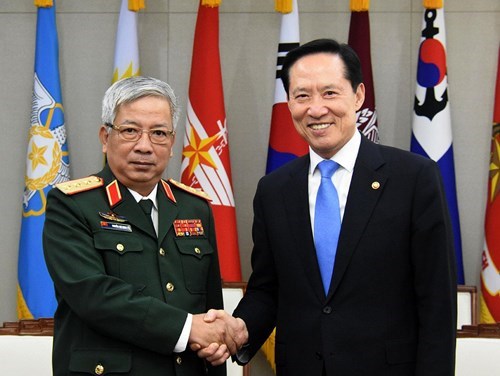Inheriting and bringing into full play the national tradition in new conditions, foreign affairs work, including defense external affairs, has become a policy on defending the Fatherland early and from afar.
The People’s Army Newspaper would like to introduce a series of writings by Senior Lieutenant General Nguyen Chi Vinh, member of the Party Central Committee, permanent member of the Central Military Commission and Deputy-Defense Minister, to clarify the matter.
Looking back upon the history, since the struggle against the Northern feudalists, the Vietnamese nation considered foreign affairs a front. In the 11th century, having defeated the Song aggressors on the North of the Nhu Nguyet River, Ly Thuong Kiet actively sent an emissary to persuade Guo Kui to withdraw all troops. After that, the Ly dynasty continued their combat on the foreign affairs front, to reclaim Quang Nguyen mountain district.
    |
 |
|
Sr. Lt. Gen. Nguyen Chi Vinh (L) and Defense Minister of the Republic of Korea Song Young-moo |
In the Tran dynasty, when the Yuan troops were defeated, we provided them with horses and boats to return home. Partly thanks to the Tran dynasty’s envoy’s perseverance and flexibility in the diplomatic struggle, the Yuan dynasty stopped their aggression.
In the struggle against the Ming troops, together with military blows were the persevering and smart diplomatic struggle and the strategy of justice which was considered as strong as ten thousand troops in an attempt to shake the combat spirit of the enemy.
After defeating the aggressors, Le Loi allocated horses, wagons and food for the defeated Ming troops to retreat in order to form a long-term peaceful and friendly ties with the Ming dynasty.
In the resistance war against the Qing aggressors, Nguyen Hue, then Emperor Quang Trung of the Tay Son dynasty, acknowledged that the Qing dynasty was ten times bigger than ours, so when they were defeated, they had to take revenge. Therefore, Ngo Thi Nham was entrusted with performing a clever diplomatic struggle, together with military attacks to urge Emperor Qianlong to withdraw his troops and agree to recognize the emperorship of Nguyen Hue.
After the success of the August Revolution in 1945, President Ho Chi Minh paid due attention to establishing diplomatic ties between Vietnam and other countries.
In face of the French colonialists’ intention to invade, President Ho Chi Minh made the most of diplomatic measures to help Vietnam avoid a war; was persevering in negotiation to the signing of the Vietnam-France Preliminary Agreement on March 6, 1946, and the Vietnam-France Provisional Agreement on September 14, 1946, so as to maintain peace and have more time for the preparation of a long-term resistance war for national independence.
In the anti-American resistance war, Vietnam received great and effective support from the Soviet Union, China, other socialist countries, and peace-lovers from all over the world, including some American people.
For the U.S., we followed a motto of “both combat and negotiation” and conducted a diplomatic struggle which lasted nearly five years, from May 1968 to January 1973, when we signed the Paris Peace Accords that allowed the U.S. troops to withdraw in honor from Vietnam and creating conditions for the victory and unification of the entire nation, minimizing people’s losses.
In peacetime, foreign affairs are important to prevent and drive back the ever-present danger of war and to defend the Fatherland. Once we are forced to fight, we actively combine political and diplomatic struggle with the military one, bringing justice to light, boosting international solidarity, coordinating closely with countries sharing the same combat trench, and the same interests and establishing a wide international homefront for the resistance war in an attempt to isolate the enemy.
When the military front made a decisive win, the enemy was weakening and the strategic posture could not be turned round, we proactively formed a diplomatic posture to launch a counter-attack against the enemy to make a swift end to the war with the best conditions for peace building, minimize damage for us and prevent wars in the future. Those are precious lessons that need to be inherited and brought into full play in the current cause of national construction and protection.
To inherit and bring into play that tradition, it is necessary to be fully and thoroughly aware of foreign affairs, including defense external affairs.
With new ideas and via summarization from reality, research on developing arguments, we have gained a full awareness of defense external affairs. Accordingly, defense external affairs constitute an important diplomatic channel, consisting of peaceful activities and measures to realize diplomatic policies and guidelines and defense policies with other countries and international organizations, contributing to meeting victoriously the goal and mission of national building and protection, and to upholding peace and stability in the region and the world. Defense external affairs are not only a purely external service of the Ministry of National Defense, the military also engages in external affairs activities in defense together with other countries and international organizations, always relating to independence, sovereignty and the national interests of Vietnam and the security and peace of the region and the world, while always being ruled by the Party, managed by the Government and directly and frequently run by the Central Military Commission and the Ministry of National Defense.
Defense external affairs work, an important element of the nation’s foreign affairs, has its own characteristics: Firstly, combining both cooperation and combat to defend the national sovereignty, territorial integrity, security and interests; secondly, contributing to peace and creating a favorable environment and taking advantage of international conditions to build and develop a nation; thirdly, contributing to improving Vietnam’s role and status in the international arena and fourthly, taking advantage of conditions from the outside world to help build the military.
Written by Senior Lieutenant General Nguyen Chi Vinh
Translated by Mai Huong